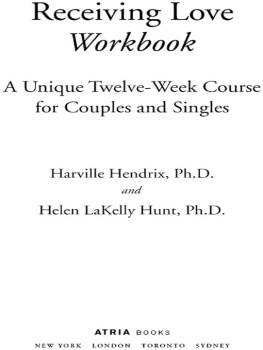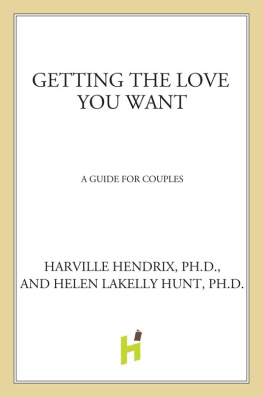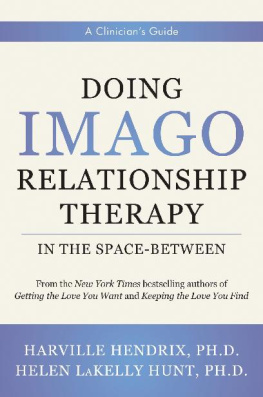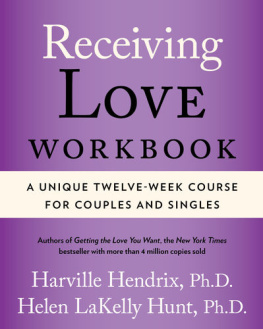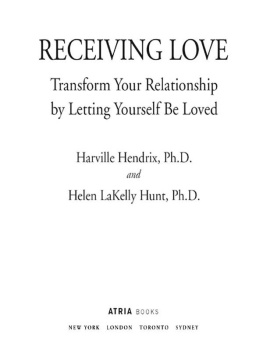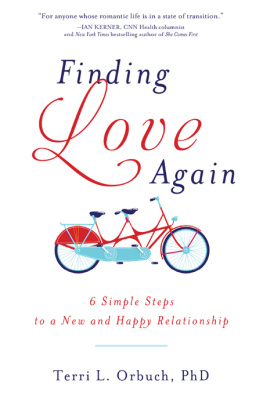All rights reserved, including the right to reproduce this book or portions thereof in any form whatsoever.
For information address Atria Books, 1230 Avenue of the Americas, New York, NY 10020
ATRIA BOOKS is a trademark of Simon & Schuster, Inc.
A Special Dedication
Jean Coppock Staeheli has been our writer and friend for many years. We want to express a special appreciation for her tireless work in bringing this project to fruition. From many random notes, conversations, and case illustrations, she has used her considerable writing talents to bring order out of chaos. We owe her a debt of gratitude for her perseverance during these months and her patience with us as we attempted to make sense out of the material. Thank you Jean.
Dedication
This book is dedicated to the Board of Imago Relationships International, Inc., a nonprofit organization created and run by Imago therapists committed to providing service to Imago therapists worldwide, and dedicated to the mission of transforming the world one couple at a time.
Receiving and Giving
Im a novice when it comes to receiving.
Giving has become my expertise.
But giving alone without getting
Becomes soon a fatal disease.
If the intake valve is not opened
Theres no way to maintain a supply.
There comes a point in the cycle of life
When the out-going stream runs dry.
Straining out love from a vacuum
Is like drinking from the heart of stone.
Try as we may, at the end of the day,
Were exhausted, frustrated, alone.
Better to give than receive, we are taught.
Yet another truth Ive learned just by living:
Only the soul with the grace to receive,
Excels in the fine art of living.
The Rev. Dr. James A. Forbes, Jr.
Senior Pastor, The Riverside Church, NYC
Copyright 1995, New York City
How to Use the Receiving Love Workbook
If you are in a committed relationship that isnt as close or fulfilling as you want it to be, this study guide is exactly right for you. Perhaps the intimacy and excitement that were there in the beginning have gone, or perhaps they were never there at all. Things are getting worse as the years pass, not better. You find yourself thinking it might make sense to end this relationship and find a partner who loves you more and can offer you the kind of hope and security you long for.
Perhaps youre upset by the indifferent or hostile way you and your partner are connecting with each other. You often feel like youre talking past each other. You dont seem to care about each others thoughts and feelings, or you become offended and defensive whenever you venture out beyond the safety of routine information. You might be able to decide whos going to pick up the dry cleaning or take the kids to practice, but anything more personal feels as if youre slipping into dangerous territory.
One wife we know described what it was like when she and her husband were living in this state of conflict: We were nothing more than roommatesroommates who didnt even like each other. They fought over everything, and couldnt stop doing battle in front of their children. It didnt take long for their pain to begin to poison the lives of their two young sons. The younger son had nightmares, and the older was showing disturbing signs of aggression in school. This couple finally reached out for help when they realized that their relationship problems were having a serious, negative impact on their children.
Sometimes, though, relationship problems are not so visible or openly expressed. Maybe you feel disappointed with your partner, rather than angry or resentful. Youre sad when you think about how seldom the two of you feel any closeness. When you think of sharing feelings of excitement or anxiety, you dont think of your partner first. You think of your mother or your best friend. You are frustrated by how difficult even the simplest interactions have become. Why is the normal give-and-take in your relationship so hard? Other people seem to be able to ask one another for help, show appreciation, and get along with good feelings most of the time. Why cant you?
The professional work weve been engaged in for the last twenty years or so has been an attempt to answer this question. What makes some relationships turn into fulfilling partnerships, and others into minefields of resentment and mistrust? How can the minefield evolve into a safe ground for nurturing growth? How can you turn your committed relationship into a partnership that heals your past wounds and fosters your wholeness?
The Receiving Love Workbook is a twelve-week course designed to help you and your partner work through the exercises in Part III of Receiving Love. This guide provides you with the complete step-by-step instructions and examples you would get if you participated in a Couples Workshop or worked with an Imago Relationship Therapist. Each of you should have your own copy of this workbook so you can each answer questions in your own book, with the privacy you want and need.
The purpose of the Receiving Love Workbook is to help you explore the consequences that self-rejection has had in your individual lives and in your relationship as a couple. One of the most significant and universal consequences of self-rejection is that it leads to an inability to receive love. Once you have an understanding of how self-rejection has kept you from being nourished by the love, appreciation, and support of those close to you, you are ready to take specific steps to surmount the self-rejection and heal its causes.
The most exciting truth weve discovered is that its possible for problematic relationships to become sources of healing and strength. Yes, you can bring back marriages that are on the brink of divorce. The same relationship that is now causing you grief can become the source of your personal happiness and spiritual growth.
At every life stage and in every way, we become who we are through our relationships. Injuries to our self-concept occur through our relationships with our parents in childhood. These injuries manifest themselves as problems in our committed adult relationships. And, these injuries can only be healed in committed adult relationships. The very person who is the cause of our unhappiness holds the key to our liberation from pain.
Before beginning this workbook, please read all of Receiving Love by Harville Hendrix, Ph.D., and Helen LaKelly Hunt, Ph.D. We also recommend that you read Getting the Love You Want, though it is not essential for the successful completion of these exercises. Your successful participation in the process cadetailed in this workbook will be greatly facilitated by having an understanding of Imago Relationship Therapy. What follows is a summary discussion of the fundamental dynamics of intimate relationships, as conceptualized in Imago. (Please refer to Getting the Love You Want for a more complete discussion of Imago Relationship Therapy.)

